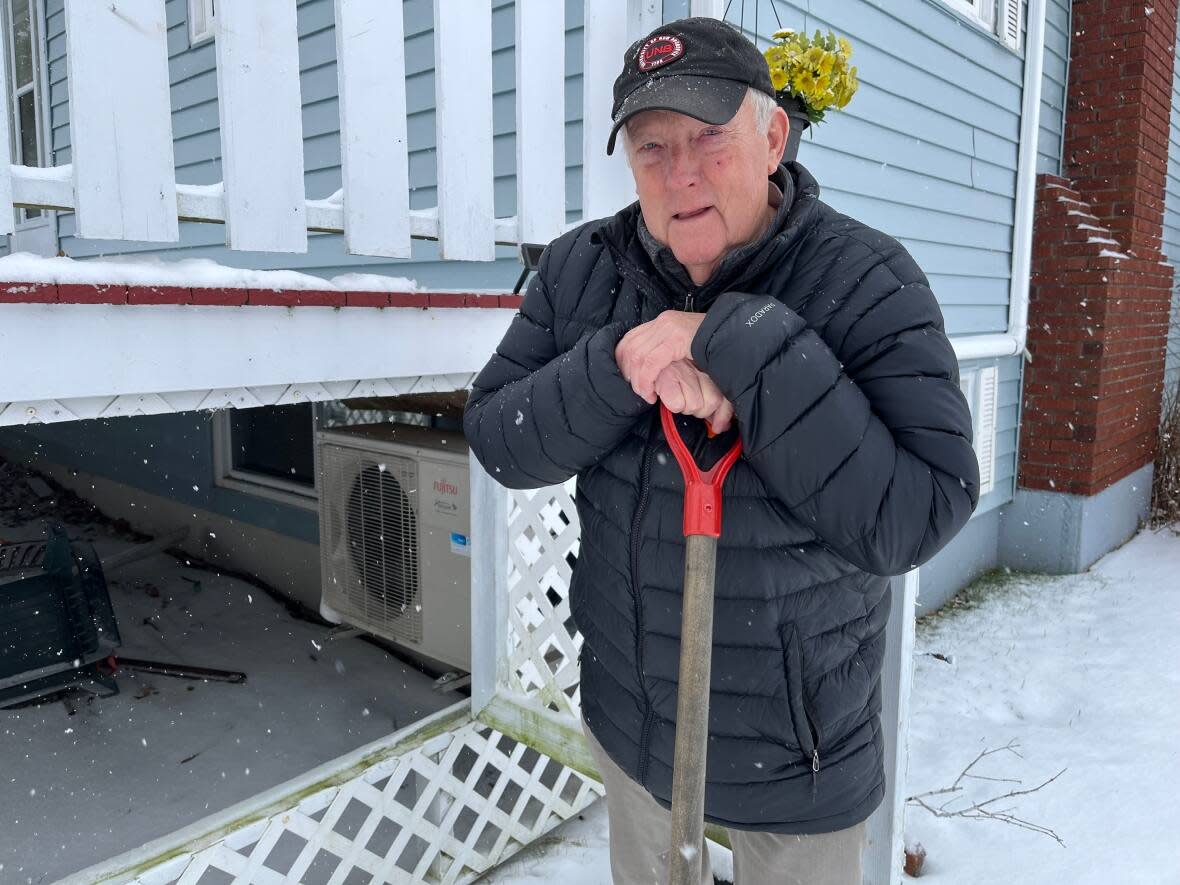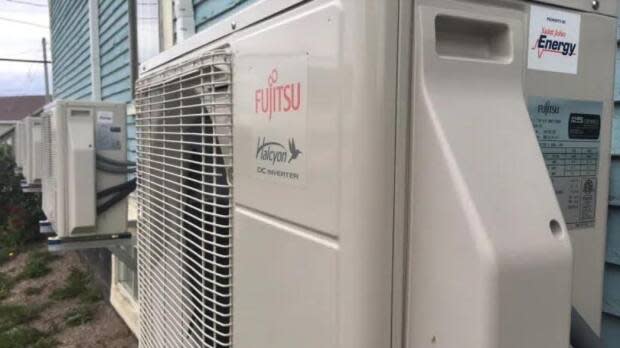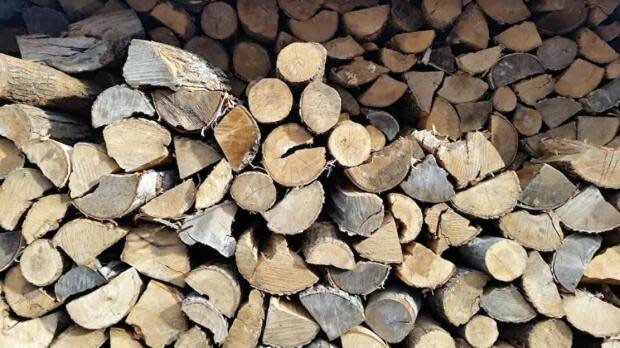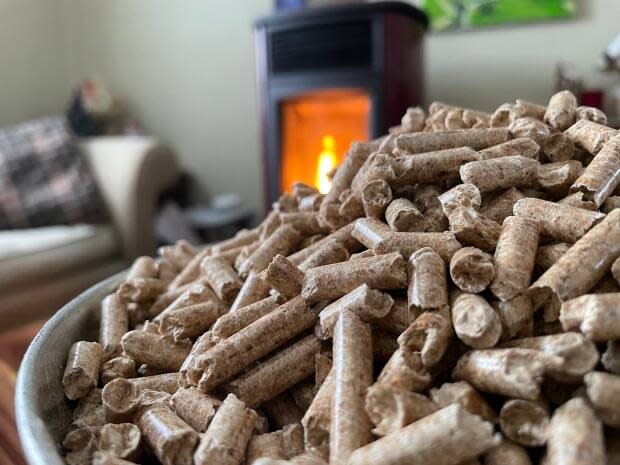Cheap heat in New Brunswick: High tech heat pumps and old school firewood offer consumers best price

Robert Kirkpatrick has lived in the same Saint John home for 50 years and even though it has always had a working oil furnace in the basement, these days he gets most his heat from a mini-split heat pump installed under his front porch.
"It's been great, really' said Kirkpatrick.
"The furnace doesn't come on and off like it used to."
According to Kirkpatrick, the heat pump supplies most of the warmth he and his wife need in winter. Better yet, at current prices, it costs him a quarter of what burning oil would to produce the same amount of heat.
Kirkpatrick is among a growing number of New Brunswick residents who have been shifting and supplementing heat sources in their homes for convenience or to save money, or both.

In some cases, changes in price for fuels over the past year has been altering what the cheapest sources of heat are in New Brunswick and in other cases, the changes have been widening differences between one fuel and another.
For consumers looking to save money, comparing a litre of oil to a stick of hardwood, or to a kilowatt hour of electricity can be tricky. And differences in the efficiency of heating appliances adds even more uncertainty.
Still, every fuel can be reduced to how many British Thermal Units (BTUs) it can produce and those are simple enough to compare to each other.
So, given current prices, what's the cheapest way to produce that much heat this month in New Brunswick?
1. HIGH EFFICIENCY MINI SPLIT HEAT PUMP -
Cost to generate 1 million BTUs of heat: $12.09
By far the most popular addition New Brunswick residents have been making in recent years, like Robert Kirkpatrick, is a mini split heat pump. Normally, heat pumps cannot entirely provide what a house needs to stay warm but it can displace a large percentage of more expensive heating sources.
According to N.B. Power, current cold weather high efficiency units now on the market have a "heating seasonal performance factor" (HSPF) of up to 9.6. That means they can produce 9,600 BTUs of heat for every one kilowatt hour of electricity they use, measured over the entire heating season.
At that output, a high efficiency heat pump needs only 104.2 kilowatt hours of electricity to produce 1 million BTUs of heat. At N.B. Power's current residential rate of 11.61 cents per kilowatt hour that would be a total bill of $12.09 plus HST.
Saint John Energy has even lower residential rates, and the same amount of heat from a high efficiency mini-split within its boundaries would cost about $11.11.
Lower efficiency heat pumps or units poorly sized for the space they are heating will not be as cost effective. But savings for consumers can be significant if the right unit is purchased and properly installed.

2. FIREWOOD
Cost to generate 1 million BTUs of heat: $15.63
Firewood is an old school New Brunswick favourite and before heat pump technology advanced was the undisputed king of cheap heat in the province for decades.
A legal cord of hardwood is 128 cubic feet and contains an estimated 24 million BTUs of energy. During combustion, modern high efficiency wood stoves can convert about 80 per cent of that into heat in a house.
That means at $300 per cord delivered, heat from hardwood burned in a high quality stove costs about $15.63 per 1 million BTUs.
3. NATURAL GAS -
Cost to generate 1 million BTUs of heat:: $27.48
Like all fossil fuels, the price of natural gas in New Brunswick this winter is higher than last winter but the increases have not been as steep as those suffered by some fuels.
Residential users of natural gas pay three charges including, in January, $12.18 per gigajoule for the gas they consume, $10.42 per gigajoule for transporting that gas through the public distribution system and a flat rate monthly service charge of $21.50.
A gigajoule of natural gas contains just under 948,000 BTUs of energy and a high efficiency natural gas furnace can convert up to 95 per cent of that into home heat. It is difficult to accurately assign the cost of the service charge, but a house that uses 10 gigajoules of gas in a month like January is likely paying an all-in price of about $27.48 per 1 million BTUs.

4. PELLET STOVE -
Cost to generate 1 million BTUs of heat:: $28.83
Wood pellets are an increasingly popular source of supplemental heat in New Brunswick but have also been increasing in price. Last week, 40 lb bags of pellets at major retailers in the province were selling for $7.38 plus HST. That is about 20 per cent more than last winter.
Each 40 lb bag of pellets contains close to 320,000 BTUs of energy and high efficiency stoves can turn up to 80 per cent of that into space heat. That puts the cost of 1 mllion BTUs at $28.23.
5. STANDARD ELECTRIC BASEBOARD
Cost to generate 1 million BTUs of heat: $34:02
Electric baseboards are the most common source of residential heat in New Brunswick. One kilowatt hour of electricity will produce 3,412 BTUs of heat and so generating 1 million BTUs takes 293 kilowatt hours of power. At current NB Power residential rates of 11.61 cents per kilowatt hour, that is $34.02.
In Saint John where residential rates are lower, the price is $31.26.
Those amounts are the same for electric space heaters and close to the same for electric furnaces, but getting heat from electric floor radiant heating will be more.
According to Efficiency Nova Scotia in-floor electric heat is less efficient than a standard baseboard and adds about 17 per cent to its cost. In N.B. Power's case that puts the price of 1 million BTUs of radiant floor heat at $40.02.
6. FURNACE OIL
Cost to generate 1 million BTUs of heat: $56.16
Furnace oil has had a terrible year for pricing. Last week around New Brunswick, retailers were charging an average price of $1.64 per litre plus HST for a delivery. That's down nearly 80 cents from peak prices in early November, but it is still almost double what consumers were paying two winters ago.
There are about 36,500 BTUs in one litre of oil and although modern furnaces can convert up to 95 per cent of that into heat, most furnaces in New Brunswick are older and considerably less efficient.
At an 80 per cent conversion rate of energy into heat, it takes 34.2 litres of oil to move 1 million BTUs of heat into a house. Even with recent price reductions, that is still $56.16. It is almost double the cost of pellet stove heat and more than four times as expensive as heat supplied from an electric heat pump.

7. PROPANE FIREPLACE
Cost to generate 1 million BTUs of heat: $57.26
Propane is difficult to price accurately for a comparison to other fuels. Last week, New Brunswick retailers were allowed to sell for 97.4 cents plus HST but may or may not offer prices below that depending on the customer.
A second issue with propane is that most customers have to rent a tank from the company, adding an extra $9 or $10 per month to the energy bill.
A litre of propane contains less energy than furnace oil, about 24,300 BTUs. When used in a fireplace, about 70 per cent ends up as usable heat. That requires 58.8 litres.
At fully-allowed New Brunswick prices, that means 1 million BTUs of heat from a propane fireplace will cost $57.26.
The amount can be considerably less than that depending on prices charged by individual retailers. It can also be less if the fuel is used in a more efficient appliance, like a propane furnace.


